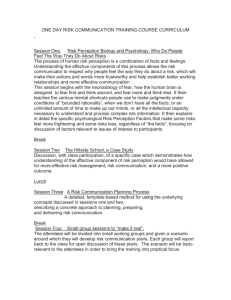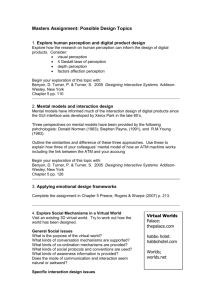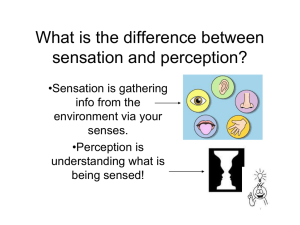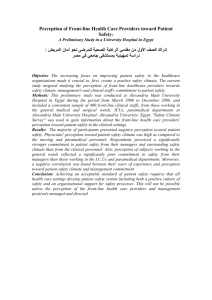slide
advertisement
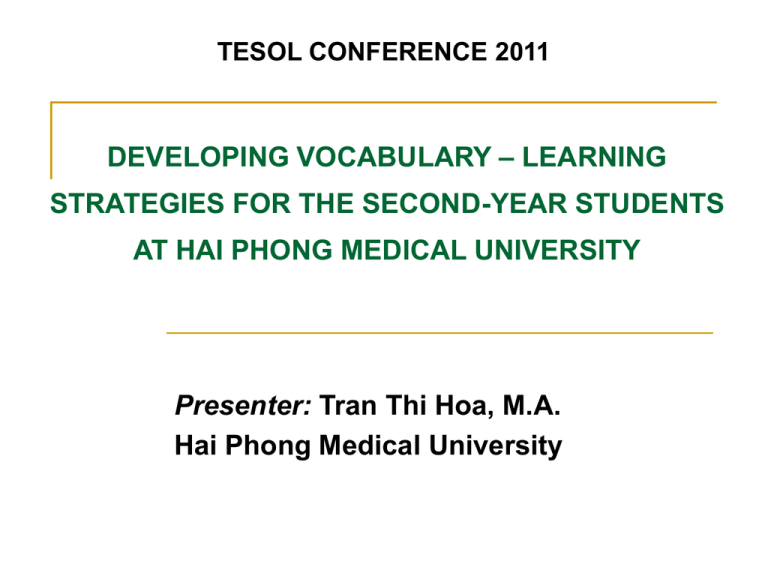
TESOL CONFERENCE 2011 DEVELOPING VOCABULARY – LEARNING STRATEGIES FOR THE SECOND-YEAR STUDENTS AT HAI PHONG MEDICAL UNIVERSITY Presenter: Tran Thi Hoa, M.A. Hai Phong Medical University RATIONALE Enlarging vocabulary is especially important for learners of pre-intermediate level The practice of learner training in Vietnamese classrooms is still open to question The local context of Hai Phong Medical University calls for the idea of developing learning strategies AIMS OF THE STUDY Improve Ss’ vocabulary learning through a training program of learning strategies Evaluate the strategy training program through Ss’ perception RESEARCH QUESTIONS What are the problems that the students encounter in their independent vocabulary learning? How effective is the strategy training programme in helping the students learn vocabulary, as perceived by the students? SCOPE OF THE STUDY The research focuses on the explicit teaching of learning strategies. Three strategy sets, namely Dictionary-related strategies, Recording vocabulary and Studying affixes, are taught. METHODOLOGY Method: Action Research Participants: + 27 second-year students + The teacher – researcher IMPLEMENTATION OF ACTION RESEARCH Conducted for 10 weeks during the second term of school year 2009 – 2010 Divided into three phases IMPLEMENTATION OF ACTION RESEARCH Phase One (Week 1-4) _ Week 1: The students were explicitly introduced to the vocabulary-learning strategy training programme. Pre-treatment questionnaires were distributed _ Week 2 – 4: The students were given a strategy teaching lesson each week. _ Three strategey sets were adapted from the taxonomy of vocabulary learning strategies suggested by Schmitt (1997) IMPLEMENTATION OF ACTION RESEARCH Phase Two (Week 5 – 7) _ Phase Two provided the students with guided practice by means of weekly word-learning records. Phase Three (Week 8 – 10) _ The students kept a free-style vocabulary diary for their independent learning. _ Post-treatment questionnaire survey was conducted INSTRUMENTS OF DATA COLLECTION Pre-treatment questionnaires Post-treatment questionnaires RESULTS AND DISCUSSION 1. Research question 1: Students’ problems in independent vocabulary learning . Figure 1. Students' problems in independent vocabulary learning 4.0 4.0 3.0 3.3 3.2 3.5 2.4 2.5 2.0 2.0 1.5 1.0 0.5 0.0 Not enough Not enough time materials Not feel interested Not know Not know how to learn what to learn RESULTS AND DISCUSSION 1. Research question 1: Students’ problems in independent vocabulary learning. Ss’ biggest problem is “not knowing how to learn vocabulary effectively” 2. Research question 2: Students’ perception of the effectiveness of the strategy training program Figure 2. Frequency of vocabulary strategy use before and after training Mean of frequency 4.5 4 3.5 3 2.5 2 1.5 1 0.5 0 4 4.3 2.9 3.3 2.4 2.2 Dictionary-related strategies Vocabularyrecording Affix-studying Before training After training 2. Research question 2: Students’ perception of the effectiveness of the strategy training program The students used the taught strategies more frequently after they had participated in the strategy training 2. Research question 2: Students’ perception of the effectiveness of the strategy training program Figure 3. Usefulness of the taught strategies % 60 51.9 Dictionary-related strategies Vocabulary-recording 51.9 50 Affix-studying 41 40 29.6 30 26 25.9 22 18.5 20 18.5 7 10 3.7 0 0 0 Mark 1 Mark 2 4 0 Mark 3 Mark 4 Mark 5 2. Research question 2: Students’ perception of the effectiveness of the strategy training program Dictionary-related strategies were considered the most useful, then vocabulary-recording, and finally affix-studying strategies 2. Research question 2: Students’ perception of the effectiveness of the strategy training program Figure 4. Effectiveness of the strategy training programme 11% 7% 15% Mark 2 Mark 3 67% Mark 4 Mark 5 2. Research question 2: Students’ perception of the effectiveness of the strategy training program The majority considered the training programme highly effective 2. Research question 2: Students’ perception of the effectiveness of the strategy training program 100% of Ss wanted to get further strategy training. Reasons: - Know how to learn vocabulary effectively - Feel more motivated and interested in learning - Help to develop the four skills - Important role of vocabulary in language learning PEDAGOGICAL IMPLICATIONS Introduce Ss to the strategies of using a bilingual dictionary and recording vocabulary as early as possible. Take account of the characteristics of each strategy. Conduct strategy instruction in a most explicit way LIMITATIONS OF THE STUDY 10 weeks might be a relatively short time for strategy training. Future research into other vocabulary-learning strategies is still much needed.

